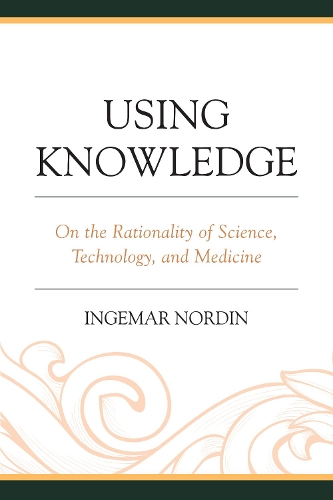
Using Knowledge: On the Rationality of Science, Technology, and Medicine
(Hardback)
Publishing Details
Using Knowledge: On the Rationality of Science, Technology, and Medicine
By (Author) Ingemar Nordin
Bloomsbury Publishing PLC
Lexington Books
31st July 2017
United States
Classifications
Professional and Scholarly
Non Fiction
501
Physical Properties
Hardback
208
Width 160mm, Height 237mm, Spine 22mm
490g
Description
In Using Knowledge: On the Rationality of Science, Technology, and Medicine Ingemar Nordin analyses the philosophical problems and nature of science, technology, and medicine. The main focus of the book is on the structure and dynamics of technological change. What implications do the goals of technology have for its rationality How can the pragmatic problem of induction be solved within a fallibilistic and skeptical context Nordin shows that the social context is of vital importance for the goal of technology (usefulness) and its rational development, with important consequences for how to design a techno policy in society. A rational technological development needs technological pluralism since knowledge of what is useful is scattered among millions of users.
Reviews
Nordin (Linkping Univ., Sweden) presents a unique approach to the philosophy of technology and philosophy of science. He distinguishes technology from science by defining technology as the functional methods for solving practical problems. Since both science and technology necessarily deal with uncertainty, the author discusses how to define a technological development as successful, considers the role of scientific knowledge in technological progress, and identifies other kinds of knowledge involved in rational decision-making. He argues that rational technological decision-making requires consideration not just of a technology's utility but also of a vast pool of knowledge from its users, with their practical understanding of their own individual needs and priorities. The importance of user input in decision-making leads to a major criticism of standard theories of technology: these theories ignore the fact that users tend to formulate their problems in terms of existing technologies. Nordin posits that competition among technologies is the best way to foster efficient progress. Testing his theories in the field of medicine and science, the author recommends pluralism of ideas as the best institutional condition for technological progress. Summing Up: Recommended. Upper-division undergraduates through faculty and professionals. * CHOICE *
Even some of the warmest admirers of Karl Popper's skeptical interpretation of theoretical science have balked at his solution to what he called 'the pragmatic problem of induction. Almost unanimously they have concluded that there can be no purely deductivist understanding of rational action. Ingemar Nordin knows better, and here sets out an approach to practice in which inductive considerations are never allowed to intrude. It is embedded in a thorough investigation of a host of problems concerned with the relation between science and technology, including medicine, and it deserves to be welcomed as the most detailed discussion of these problems that we have. In the skeptical spirit of deductivism, I am delighted to recommend it. -- David Miller, University of Warwick
This is a primer in the philosophy of technology. It tackles the main philosophical problems raised by technology, and does so in plain language, which makes it an ideal textbook for engineering, medicine, business, and humanities students. -- Mario Bunge, McGill University
Ingemar Nordin has in this book made a fresh and original contribution to the philosophy of technology. He emphasizes that technology, although dependent on science, is something far beyond science. The concept of truth that is so central to science has a less prominent place in technology, where instead functionality and usefulness are the most crucial concepts. Technologists often knowingly use approximate, and hence untrue, theories and models for constructing techniques. Nordin develops these fundamental concepts of technology in a highly fruitful way, partly by engaging himself in a fascinating debate with some of the most prominent contemporary philosophers of science and technology. -- Lennart Nordenfelt, Ersta-Skndal-Brcke University College
Author Bio
Ingemar Nordin is professor of philosophy at Linkping University.
